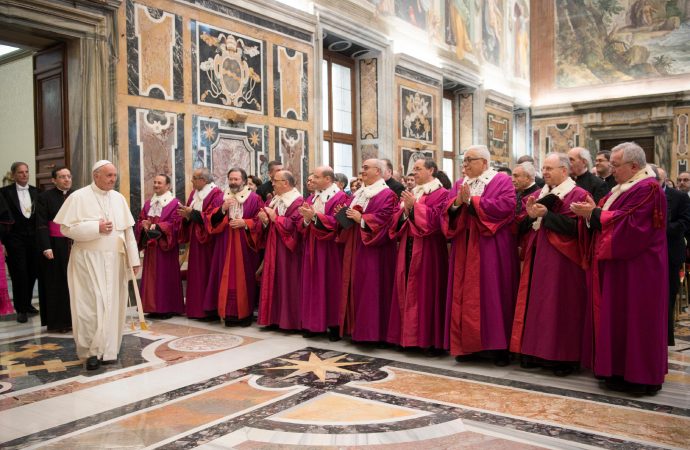Through two contentious summits of bishops on the family in 2014 and 2015, which produced a cautious papal opening to communion for divorced and civilly remarried Catholics, there was a constant objection that the process focused too much on cases where marriages break down and not enough on the many instances in which they actually work.
On Tuesday, Pope Francis celebrated those quiet success stories, saying they may not make headlines but they do offer a “daily sermon” about the power of unity and fidelity.
Speaking to the Roman Rota for the inauguration of their judicial year, the pope said spouses who live marriage with unity and fidelity, and who lean on God’s grace to support one another, are “a precious pastoral help to the Church” and offer the world “an example of true love … becoming witnesses and cooperators in the fecundity of the Church itself.”
“They are a silent sermon to all, a ‘daily’ sermon,” he said, adding that “unfortunately we must admit that a couple who has lived together for many years doesn’t make news, while scandals, separations and divorces make the news.”
The Roman Rota is the Vatican’s main working court, mostly handling marriage cases from various parts of the world. Francis’s annual speech to its members took place Jan. 29, and it falls just three years after he streamlined the marriage annulment process.
In his speech, the pope told Monsignor Pio Vito Pinto, Dean of the Roman Rota, and the other judges that unity and fidelity in married life are a remedy for an increasingly secular culture which often makes it difficult for Catholics, married couples included, to live “a lifestyle according to the Gospel.”
Unity and fidelity, he said, “are two important and necessary values” not only for spouses, but in all interpersonal and social relationships.
Everyone is aware of the setbacks, unfulfilled promises and the lack of fidelity to commitments, he said, saying that protecting the “undeniable and constructive” good of marriage is not only the responsibility of spouses but also the Church’s priests and bishops as they accompany couples at every stage of their lives.
Francis closed saying the work of the Rota, beyond the importance of the judgements rendered, helps to “correctly interpret matrimonial law.”
Saying the tribunal helps in the Church’s wider task of the salus animarum, or the “salvation of souls,” he asked that God bless the judges in their work during the coming year and offered his blessing.

